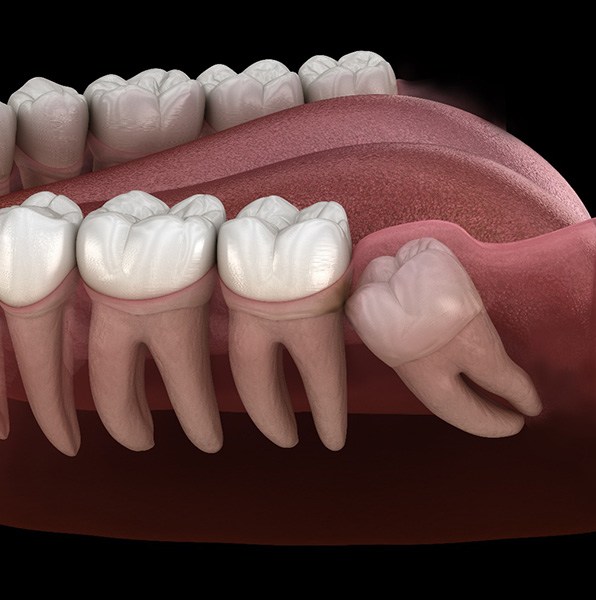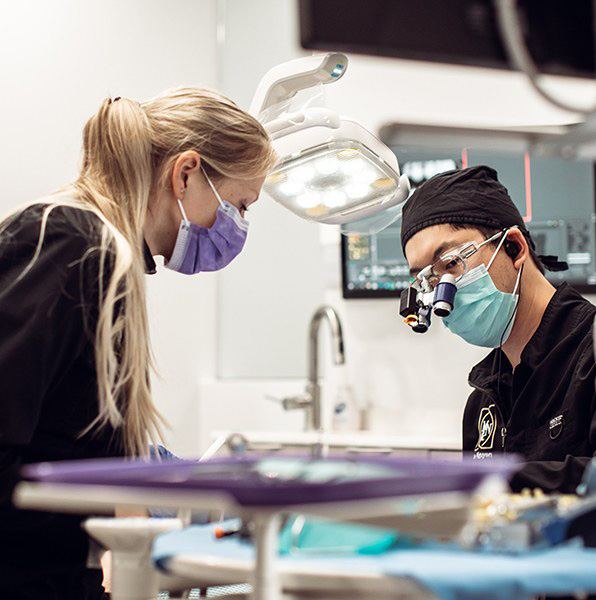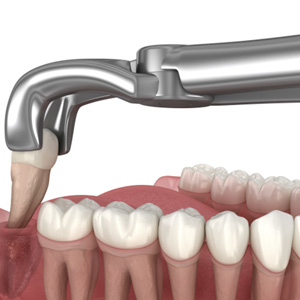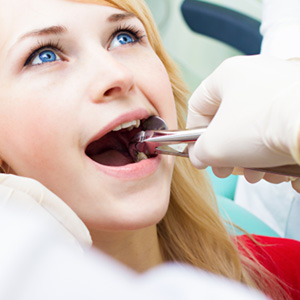Wisdom Tooth Extractions – Jacksonville, FL
Keeping Your Smile Healthy for a Lifetime
Have you recently begun struggling with jaw pain? The root of the problem might surprise you: your wisdom teeth. Sometimes, these teeth grow in perfectly straight and without any complications. Other times, their emergence results in considerable problems, including discomfort, inflammation, and even tooth decay. That’s why our Jacksonville dentists will monitor their development throughout the years and intervene with the necessary care if/when it’s time to have them removed.
Why Choose Distinctive Dentistry by Mullens & Nguyen for Wisdom Tooth Extractions?
- Dentists Experienced in Oral Surgery
- 3D Cone Beam Imaging System
- Community-Trusted Dental Office
What are Wisdom Teeth?

Wisdom teeth (also known as third molars), get their name because they typically grow in between the ages of 17 and 25. Some people don’t have them, while others can have one, two, three, or four. As they develop, our team will keep a close eye on whether or not they could pose a risk to your oral health down the road. If we believe they may, we can offer wisdom tooth extractions in Jacksonville, FL to keep your smile aligned and healthy.
Why Do Wisdom Teeth Need to Be Removed?

Not all wisdom teeth need to be removed, but those that pose a threat to your oral health or surrounding teeth should be extracted as a preventive measure. Here are a few situations in which we may suggest wisdom tooth extraction:
- There’s not enough room in your jawbone for them to grow in
- Allowing them to grow in could result in orthodontic problems
- They’re impacted below the gumline
- They’re causing severe pain or make it difficult to eat
- A cyst or tumor could develop as a result of impaction
To keep on-top of this situation, be sure to visit us every six months for your checkup and cleaning. If you’re between the ages of 17 and 25 and don’t know whether you should have your wisdom teeth removed, please contact our dental office to set up an appointment.
What to Expect from the Wisdom Teeth Procedure

There are two ways to remove wisdom teeth: a simple extraction and a surgical extraction. With a simple extraction, we thoroughly numb your mouth and use special tools to gently rock the tooth loose. When it’s ready to come out of the socket, we will remove it and care for the extraction site. With a surgical extraction, the first step is the same: thoroughly numbing your mouth. Then, the procedure changes a bit. We will create a small incision in your gums to access the tooth underneath before removing it and caring for the extraction site.
Recovering from Wisdom Teeth Extraction

Remember, the healing period is extremely important. To prevent blood clots and other complications, we strongly recommend following all of the aftercare instructions provided to you, including:
- Not spitting or drinking through a straw
- Sticking to soft foods, like plain yogurt
- Taking OTC pain medication as directed
- Getting plenty of rest
- Staying hydrated
- Keeping your mouth clean
If you have any questions about wisdom teeth extractions or you need to schedule an emergency appointment with us, don’t hesitate to visit our website or call – we’re here to help!
Understanding the Cost of Wisdom Tooth Extractions

Because most dental insurance plans don’t cover the full cost of wisdom tooth extractions, paying for treatment can be a major concern. However, because all extractions are different, prices for care can vary greatly from patient to patient. Here’s a closer look at how we determine the cost of your wisdom tooth extraction, and a few ways we can help make treatment more affordable.
Factors That Can Impact the Cost of Wisdom Tooth Extractions

There are a variety of different factors that can affect the cost of your wisdom tooth extraction. These will be covered in greater detail during your consultation with your dentist, but may include:
- How many wisdom teeth need to be removed. Not everyone is born with four wisdom teeth. In fact, some people will only get one, two, or three. In other cases, you can also have five or six.
- Whether or not your wisdom teeth are impacted. If your wisdom teeth are impacted, these could require surgical removal, and possible referral to an oral surgeon.
- Types of anesthesia/sedation required. If your procedure requires any sedation or anesthesia, this can increase the cost of your extraction.
- Type of dental specialist you see. While we can handle most wisdom tooth extractions in-house, should you need to be seen by an oral surgeon, this could come at a higher cost depending on your dental insurance.
Does Dental Insurance Cover Wisdom Tooth Extractions?

Unfortunately, not all dental insurance plans offer benefits for dental surgeries. However, most will cover at least a portion of your wisdom tooth extraction. This will depend largely on whether you’ve met your deductible or maximum for the year. The best way to learn more about your specific plan is to call your insurance company directly. Selecting an in-network provider can also help you minimize any out-of-pocket costs.
Other Options for Making Wisdom Tooth Extractions Affordable

In addition to accepting most dental insurances, we are also happy to accept funding through CareCredit, a third-party financier that can help you break up the cost of your treatment into flexible, monthly low-to-no interest payments.
Wisdom Tooth Extractions FAQs
Does everyone have wisdom teeth?
Most people have four wisdom teeth, one for each quadrant of the mouth; however, some only have three, and others may not have any at all. According to the Dental Research Journal, a 2015 study found that between 5 and 37% of people are missing one or more of their wisdom teeth.
Although it’s unclear why some people do not have these third molars, it’s possible that genetics could be to blame. It is important to remember, though, that just because you cannot see your wisdom teeth does not mean they’re not there. It’s possible that they might be impacted (underneath the gumline). Only a dental X-ray can tell.
How do you make wisdom teeth pain go away?
The only guaranteed way to eliminate pain caused by wisdom teeth is to have them removed by a dentist or oral surgeon. There are a few home remedies you can try to use that will help control some of your discomfort, such as using a cold compress and applying it to the outside of your cheek for 20 minutes at a time. By doing this for a few hours, you can numb the area and minimize swelling.
You can also take an OTC pain reliever as directed for temporary relief. Just be sure not to apply aspirin directly to the affected area, as this can irritate the tissues and worsen the discomfort. Another option is an OTC numbing gel that temporarily soothes gums. You can also rinse with warm saltwater to reduce bacterial buildup.
How soon can I eat after wisdom teeth removal?
Once your wisdom tooth extraction is complete, you’ll need to wait a few hours before attempting to eat. You’ll still be wearing gauze to minimize any bleeding, so it’s best to wait until you no longer need them. Although you may feel hungry, it’s important to follow your dentist’s instructions when it comes to choosing which food to eat.
Soft foods are best, as they don’t require much pressure. Trying to eat immediately following your surgery can be a problem, especially since you’ll likely still be feeling the effects of the anesthesia. If you are still numb, you may accidentally bite down on your lips, cheeks, or tongue.
For the first day, stick to a liquid diet but avoid the use of a straw. In the following days, eat only soft foods. Once four or five days go by, you can begin to incorporate denser foods as you feel comfortable.
What happens if you smoke after wisdom teeth removal?
After undergoing an oral procedure like wisdom tooth extraction, it’s important that you do not smoke or use any kind of tobacco products. The reason is that it can increase your chances of developing a dry socket. This is when the blood clot that forms over the surgical site becomes dislodged, resulting in extreme pain and a heightened risk of infection. Not to mention, the healing process becomes delayed if you develop a dry socket. Because smoking weakens the immune system, it can be much harder to fight off any kind of infection, essentially putting your oral and overall health at risk.
You should plan to avoid smoking or using any kind of tobacco for at least 48 hours; however, it’s best to wait even longer if possible. If you know that you’re preparing to have your wisdom teeth removed, use it as an opportunity to try and kick your habit for good.
